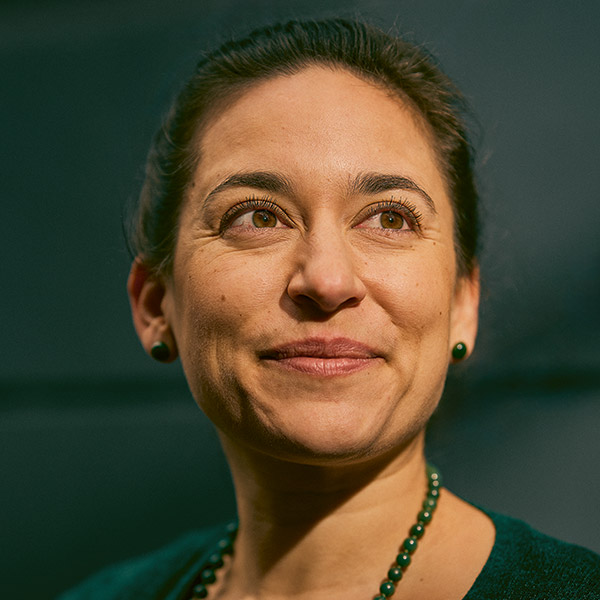Parlez-vous English?
Whenever a study programme is listed as being in ‘German’ or ‘French’, there’s still a good chance that English will be in it too. This is increasingly the case even at Bachelor level. Many universities see this simply as a fact they have to cope with. But it doesn’t have to be this way.

For the linguist Rita Franceschini, the main issue goes beyond whether to use English. It’s that students should understand their language of tuition. | Image: Valérie Chételat
A psychology professor from Germany is teaching a Bachelor course at the University of Geneva – in English. The art history programme at the University of Zurich is offered in German according to the website – but an English course turns out to be part of it. Along with globalised research, the academic elite arriving in Switzerland is teaching students in English. Mostly it’s not even their mother tongue. In response to a query from Horizons, the Universities of Basel, Bern, Geneva and Zurich have confirmed that the trend is increasing. However, there are no statistics as to the proportion of courses taught in English at Bachelor and Master level.
Don’t believe what’s on the label
English as a medium of instruction can be a barrier, says Josef Stocker of the Association of Swiss Student Bodies (VSS): “For fresher students, language is an additional hurdle”. But it’s not insurmountable, he says, and in many subjects it makes sense to have English as the medium of instruction. He is a student of mathematics himself, and he sees the clear necessity of being able to make yourself understood, also in an international environment. And yet, having courses in English means extra effort for many students, he says. “It would be good to have more transparency at the universities regarding the actual percentage of English-language courses”. Today, he claims, university regulations are sometimes ignored because there are no staff available who can teach in the respective national language. It would also be useful if the universities could actively support students to reach the necessary level of competency in their language of instruction.
The regulations, directives and language policies of the Swiss universities are very different, and often also very vague. A directive of ETH Zurich from the year 2010 stipulates that the language of instruction in the Bachelor is essentially German – but English or French may also be officially employed, depending on the respective programme regulations. On its website, EPFL states that French and English are the languages of instruction, though the first Bachelor year will be taught primarily in French. From the second year onwards, up to 50 percent of the courses may be in English, it says. The Master programme can be mostly in English, mostly in French, or bilingual, dependent on the respective curriculum on offer. At the University of Basel, the Bachelor is taught ‘mostly in German’. And at the University of Zurich, the faculties make their own decisions.
Universal understanding?
There are big differences, depending on the subject. In the natural sciences, the life sciences and social sciences, no one can avoid English. And even in the humanities, this is increasingly the case. Pessimists fear an impoverishment of scholarship through the uniformity of language, whereas optimists see a chance for universal understanding through the use of a scholarly lingua franca.
You can’t manage without English, says Gerd Folkers, President of the Swiss Science and Innovation Council (SWIR): “Students have to be able to read sources and articles in the original language”. He supports calls for a transparent approach towards the language of instruction at Swiss universities: “It is crucial to make the rules of the game clear”. He also advises dealing with foreign languages in a deliberate manner instead of simply taking arbitrary decisions: “It’s about getting the right balance and about finding the appropriate language for the appropriate content”.
With this, he broaches a fundamental distinction in the field of scholarship. Much scholarly content is described relatively independently of any linguistic constructions – in a so-called ‘theoretical language’. This becomes clear in highly formalised sciences such as mathematics. This content is then taught, discussed or reported in a specific language – be it German, French or English. Folkers teaches chemistry at ETH Zurich, and illustrates things as follows: “If I lecture in the English language in German-speaking Switzerland about the biochemical impact of new antibiotics, then I use our theoretical language. But if I speak about its possible application in pig feed and its problematical consequences for human beings, then German might be the better choice of language because the brain can order complex interdisciplinary facts better in one’s mother tongue”.
Planned multilingualism
This is why Gerd Folkers argues in favour of a more conscious approach to multilingualism. English might have emerged as the language of basic consensus; “But is a university really the right place for us to agree on the lowest common denominator?”, he asks. He believes it would be more courageous to improve English skills in language courses, in group sessions and tutorials on the one hand, but on the other hand to engage in a multilingualism in order to promote a scientific discourse in the students’ respective first language. After all, if a biologist is taught primarily in English in his main subject, how is he or she supposed to explain a nature conservation project at a local community meeting in German or French?
Rita Franceschini is a professor of linguistics at the University of Bolzano in northern Italy, and she’s demanding a complete rethink. “I would like to see a more dynamic development, a real multilingualism”. The universities shouldn’t regard English as a problem, she says, but should rather take a more deliberate approach to their multilingualism.
nstead of using a specific language at a specific time, concepts should be introduced in parallel languages at the same time wherever possible – for example, in English and in a local language. Franceschini’s reasoning is simple. She is convinced that “solely monolingual teaching is no longer sustainable”. Thanks to international mobility, the linguistic profiles of academics are getting more varied. And she doesn’t just mean English, which is often the second language of university lecturers: if a professor has roots in Italian Switzerland, but grew up in Germany and studied in England, then he – or she – can quite possibly debate matters better in English than in German or Italian. Language is the means of communicating new knowledge.
“The question is: how can you get students to acquire this knowledge?”, asks Franceschini. One way is to link it to knowledge they already possess, she says. This might succeed in either English or in one of the national languages – independently of the competence of the person teaching them. “More attention should be paid to this than to the language concept of a university”.
Compulsory national languages?
At Franceschini’s university in Bolzano, the official language policy takes the trilingual nature of its region into consideration. Here, German, Italian and Ladin are spoken. Professors are given financial incentives to learn German or talian “at least as an everyday language”, so that they can converse with the students. “Language policies like this would also be preferable at Swiss universities”, says Franceschini. But the reality is different, despite the country’s four national languages. Only a few universities have a language policy that regulates their approach both to the national languages and to English. One of these is the University of Geneva. But when we asked the organisation swissuniversities and assorted Swiss institutions of tertiary education whether professors from abroad should learn one of the national languages, their answer was typically Swiss and federalist: Every university should decide that for itself.
Pascale Hofmeier is a science editor at the SNSF.




